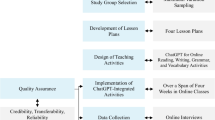Abstract
This study compares pencil-and-paper and computer-assisted versions of a college process/model program in critical thinking and academic writing to a traditional composition program. Students in the experimental sections used more linguistic markers of argument and comparison/contrast, attempted more arguments and made stronger arguments. CAI students also did better than students in the pencil-and-paper sections on some measures. Applications of computer assisted techniques in studying meaning in poetry, teaching technical writing and in teaching practice, suggest new approaches to collaborative thinking and writing.
Similar content being viewed by others
Works Cited
Adelstein, Michael and Jean Pival. The Writing Commitment. New York: Harcourt Brace Jovanovich, 1976.
Bacig, Thomas. “A Humane Rationale for Composition.” In Readings for Teaching English in Secondary Schools. Ed. Theodore Hipple. New York: Macmillan, 1973, pp. 299–307.
Barker, S. The Elements of Logic. 4th ed. New York: McGraw-Hill, 1985.
Casty, Allan and Richard Dodge. The Writing Project. Belmont, CA: Wadsworth, 1982.
Coe, Richard. “An Apology for Form: Or Who Took the Form out of the Process?” College English, 49 (1987), 13–28.
Hays, William. Statistics. New York: Holt, 1963.
Heffernan, James and John Lincoln. Writing: A College Handbook. New York: Norton, 1982.
Larmouth, Donald. “Models in Remedial English: An Interim Report.” Minnesota English Journal, 6, 2 (1970), 21–24.
Larmouth, Donald. “Design for a Highly Structured Writing Laboratory.” Wisconsin English Journal, 22 (1979), 7–3, 20.
Larmouth, Donald. Socrates: A College Writing Program. Acton, MA: Copley, 1986. (Update and revision of 1984 version)
Odell, Lee. “Measuring Changes in Intellectual Processes as One Dimension of Growth in Writing.” In Evaluating Writing: Describing, Measuring, Judging. Ed. Charles Cooper. Buffalo, NY: National Council of Teachers of English, 1977.
Opack, Michele and Barbara Perushek. “A Preliminary Study of the Effects of Modelled Writing on Student Performance.” Unpublished paper presented at the Conference on College Composition and Communication, Minneapolis, 1985.
Salmon, Merilee. Introduction to Logic and Critical Thinking. New York: Harcourt, 1984.
SPSS-X User's Guide. Chicago: SPSS Inc., 1986.
Steel, Roger and James Torrie. Principles and Procedures of Statistics: A Biometrical Approach. New York: McGrawHill, 1980.
Author information
Authors and Affiliations
Additional information
Thomas Bacig is a Professor of Humanities at the University of Minnesota, Duluth with research i interests in: computer assisted instruction in writing, reading and thinking; science fiction; and forest history. His most recent publication is: “How Computer-Assisted Instruction Informs the Design of Conventional Classroom Activities in English Composition” (with D. Larmouth), Proceedings of the 19th Annual Small College Computing Symposium, 1987.
Robert Evans is Associate Professor of Philosophy at the University of Minnesota, Duluth with research interests in logic, American philosophy and philosophy of law. His most recent publication is a review of Volume 11, John Dewey, The Later Works containing Dewey's major political work, Liberalism and Social Action, in Transactions of the Charles S. Peirce Society, 15, winter 1989.
Donald Larmouth is Professor of Linguistics and Dean of Arts, Sciences and Graduate programs at the University of Wisconsin, Green Bay. He has research interests in dialect geography, computers in composition and language policy. His most recent publication is “Does Linguistic Heterogenity Erode National Unity?” in Thomas Tonneson's Ethnicity and Language, Institute on Race and Ethnicity of the University of Wisconsin System, 1988.
Kenneth Risdon is Assistant Professor of Composition at the University of Minnesota, Duluth with research interests in writing with computers, use of computer networks, and computer analysis of text.
Rights and permissions
About this article
Cite this article
Bacig, T.D., Evans, R.H., Larmouth, D.W. et al. Beyond argumentation and comparison/contrast: Extending the Socrates CAI design principles to classroom teaching and the interpretation and production of other forms of discourse. Comput Hum 24, 15–41 (1990). https://doi.org/10.1007/BF00115026
Issue Date:
DOI: https://doi.org/10.1007/BF00115026



